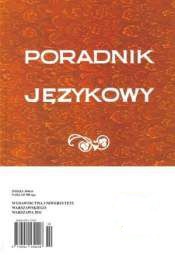WYKORZYSTANIE BADAŃ PSYCHOLINGWISTYCZNYCH W JĘZYKOZNAWSTWIE - REFORMA ZASTANEGO PORZĄDKU CZY PROWOKACYJNE PODWAŻENIE KLASYCZNEJ TEORII KATEGORYZACJI?
The Use of Psycholinguistic Research in Linguistics - A Reform of the Present Order or Provocative Denial of Traditional Theories of Categorization?
Author(s): Ewa Haman, Aneta CibikSubject(s): Language and Literature Studies
Published by: Dom Wydawniczy ELIPSA
Keywords: kaPsycholinguistic; Linguistics; Categorization; językoznawstwo; psycholingwistyka
Summary/Abstract: The article is a suggestion to verify linguistic theories with the help of experimental methods applied in psycholinguistics. Conducted research works concerned categorization of participles in Polish. Their place in the system is ambiguous when we try to classify them according to classical rules, based on mathematical logic. In our experiment, we used the lexical decision task method, where verbal stimuli (we compared nouns, verbs, adjectives, participles and gerunds) differed from one another in the frequency of appearing in Polish, the length measured with the number of letters and their grammatical category. The response time was a measured variable. It turned out that there is a substantial difference in the response time between verbs and both nouns and adjectives, whereas there is no difference in the response time between participles and both verbs and adjectives. Additionally, the response time to participles indeed differs from the processing time of inflected forms of verbs. These results show that participial forms are derivatives situated among categories of verbs and adjectives.
Journal: Poradnik Językowy
- Issue Year: 2007
- Issue No: 08
- Page Range: 30-44
- Page Count: 15
- Language: Polish
- Content File-PDF

